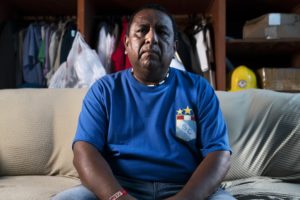
Franklin Anchahua cleared thick layers of dust in offices, apartments and even in a chapel in lower Manhattan for weeks after the 9/11 attacks. At first, he treated his heartburn and acid reflux with herbs his mother sent from Peru. He avoided available health programs because he was undocumented and feared deportation.
He sought medical treatment 10 years later when his condition worsened. Hired informally by cleaning companies, undocumented workers cleared debris, asbestos, and dust inside lower Manhattan buildings for months without adequate protective gear. Now, some are struggling to cope with how the disaster transformed their lives, they are also treated for anxiety, depression, and post traumatic disorder.
Anchahua along other undocumented clean-up workers have asked to obtain legal status to compensate for the work and health problems they’ve suffered since the attacks. However, 20 years after 9/11, only several dozen are still participating in protests and making the request, while others have abandoned that fight.
“It is hard to find a job here without immigration status. Attorneys who helped us years ago told us we would get immigration papers but, look, 20 years have passed, and we have nothing,” Anchahua said. Former U.S. Rep. Joseph Crowley announced a bill in 2017 to put Sept. 11 responders and clean-up workers on a fast track to legal immigration status in the U.S.
His office estimated then that 1,000 to 2,000 undocumented clean-up workers would be covered. But the bill did not go very far, and it has not been reintroduced by any of Congress person since Crowley retired.
Rosa Bramble Caballero, a licensed clinical social worker, has helped these workers for 15 years, first in partnership with state and local programs to assist them and afterward voluntarily, organizing meetings at the basement of her office in Queens. Dozens of cleanup workers have shown up there to talk, eat chicken and cheese empanadas, and sip coffee together.
“This became a space so they could feel safe, talk about their lives, about their needs, but most of all, support each other, not feel alone,” said Bramble Caballero.
A few undocumented workers are organizing a protest this October 2021 to push the government to establish a pathway for legal residency for undocumented cleanup workers. They have done similar protests in the past.
Luis Soriano, a clean-up worker who left the U.S. because of his elderly mother said, “We need to be remembered. We were all immigrants who contributed to the U.S. We worked hard there, paid taxes, grew old there. Some cleanup workers I knew died of cancer. We should all be remembered for what we did.”

Recent Comments